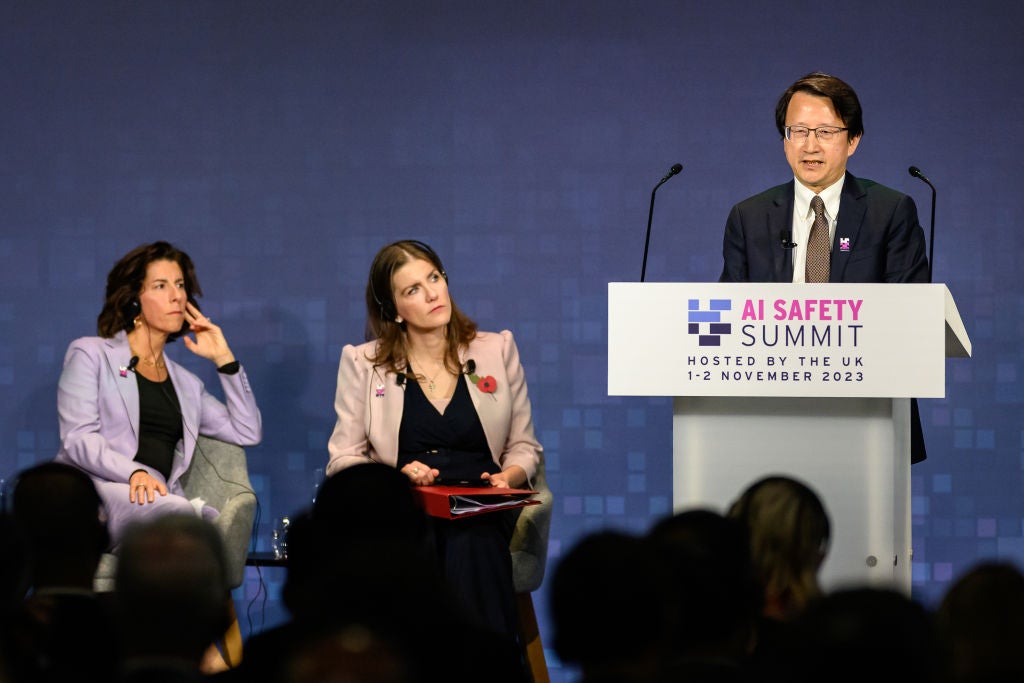
The UK government’s AI Safety Summit has brought together world leaders to discuss the “catastrophic harm” that the emerging technology may cause.
As the first day of the two-day event draws to a close, after a day of roundtables focusing on things like uncontrollable AI, skepticism remains around how much of an impact the summit will have on AI development.

Access deeper industry intelligence
Experience unmatched clarity with a single platform that combines unique data, AI, and human expertise.
With over 100 representatives from academia, business and politics, the focus of the event has firmly remained on the threats posed by large-scale “frontier AI” models.
The UK government defines frontier models as: “Highly capable general-purpose AI models that can perform a wide variety of tasks and match or exceed the capabilities present in today’s most advanced models.”
During the first day of the event, 28 countries, from continents including Africa, the Middle East, and Asia, as well as the EU, reached a world-first agreement to establish a shared understanding of the opportunities and risks posed by frontier AI.
“This is a landmark achievement that sees the world’s greatest AI powers agree on the urgency behind understanding the risks of AI – helping ensure the long-term future of our children and grandchildren,” UK Prime Minister Rishi Sunak said.

US Tariffs are shifting - will you react or anticipate?
Don’t let policy changes catch you off guard. Stay proactive with real-time data and expert analysis.
By GlobalDataHowever, as previously reported by Verdict, the narrow focus of the UK AI Safety Summit on large-scale threats and Big Tech has been met with criticism from smaller players wanting representation, as well as from those who feel that the doom-and-gloom prophecies should not dominate the conversation.
Meta’s president of global affairs and former UK deputy prime minister Nick Clegg compared the discourse surrounding AI to the “moral panic” over video games in the 80s.
The Meta executive said: “New technologies always lead to hype. They often lead to excessive zeal amongst the advocates and excessive pessimism amongst the critics.
“I remember the 80s. There was this moral panic about video games. There were moral panics about radio, the bicycle, the internet.
“These predictions about what’s going to happen next, what’s going to happen just around the corner, often doesn’t quite turn out as those who are most steeped in it believe.”
Summit highlights calls for imminent AI regulation
Unlike the EU and China, the UK has taken a cautious approach when it comes to envisaging regulatory frameworks for AI.
“The UK is not putting in place any statutory regulations for fear of stifling innovation,” Laura Petrone, principal analyst at GlobalData, told Verdict.
Speaking at the UK AI Safety Summit, European Commission president Ursula von der Leyen heralded the EU’s AI Act as “innovation friendly”, claiming the industry needs to combine “smart regulation with voluntary commitments”.
The summit’s focus on large-scale threats has highlighted businesses’ calls for clearer legislation across the board for AI.
Chris Briggs, Global SVP of Identity at Mitek, told Verdict that enforceable international laws surrounding AI are needed “to ensure the safety of all people, our global economy, and our ongoing quest for equitable and just societies worldwide”
“Guidelines are not enough,” he said.
Rajesh Ganesan, president of Manage Engine, the global enterprise IT division of Zoho Corporation, told Verdict that its important to not lose sight of the importance of making AI adoption about the people.
“We need to prioritise ongoing education and give people the skills to use generative AI systems securely and safel,” he said, “failing to make AI adoption about the people who use and benefit from it, risks dangerous and suboptimal outcomes.”
Ganesan believes that AI regulation remains on the horizon, even if some feel disappointed that it won’t be established at the Summit.
“It’s clear that tethering AI will not be easy, the dangers posed by frontier AI will continue evolving and keep everyone on high alert for some time,” he said.
“Yet, gaining international agreement on the mechanisms for managing the risks posed by AI is a significant milestone—greater collaboration will be paramount to balancing the benefits of AI and limiting its damaging capacity,” he said.
Adding: “While some may be disappointed if the summit falls short of establishing a global regulatory body, AI regulation remains firmly on the horizon.
“It’s clear that regulation and security practices will remain critical to the safe adoption of AI and must keep pace with its rapid advancements. This is something that the EU’s AI Act and the G7 Code of Conduct agreements could drive and provide a framework for.”
Alwin Magimay, global head of AI at PA Consulting, told Verdict that implementing principles and regulation into AI will prove challenging.
“Even if, by good fortune, a common outlook emerges, putting principles into practice will remain just as challenging,” Magimay said.
“Without an enforcement authority, guidelines will simply be ignored,” he said.







